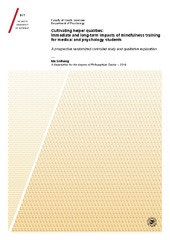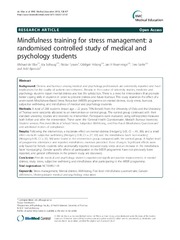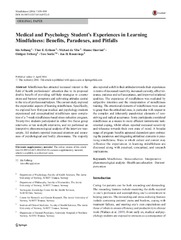| dc.contributor.advisor | Jan, Rosenvinge | |
| dc.contributor.author | Solhaug, Ida | |
| dc.date.accessioned | 2016-11-30T14:32:00Z | |
| dc.date.available | 2016-11-30T14:32:00Z | |
| dc.date.issued | 2016-11-11 | |
| dc.description.abstract | This thesis explored the immediate and long-term impact of participating in a 7-week mindfulness-based stress reduction intervention on medical and psychology students.
A significant proportion of healthcare professionals experience distress and stress-related burnout, which have been linked to patient dissatisfaction, worse patient outcomes, and increased rates of medical error. Distress, burnout, and stress can occur early in the educational process, and medical and psychology students report increasing levels of stress and mental distress during educational training.
A randomized controlled trial involving 288 students from two Norwegian universities was conducted and immediate, two- and four-year follow-up effects were evaluated. We also explored participants’ experiences in learning mindfulness using a qualitative approach.
The results indicate that a mindfulness-based intervention can reduce distress and enhance adaptive coping responses and self-reported mindfulness disposition in medical and psychology students both in the short and long run. Short-term gains were only significant for women, while long-term gains were observed regardless of gender. The frequency of practicing mindfulness exercises increased self-reported mindfulness disposition, and increases in mindfulness disposition mediated long-term intervention effects. However, students practiced mindfulness exercises infrequently. The qualitative data highlighted the value and also complexity in learning mindfulness, particularly with respect to developing mindfulness attitudes (i.e. acceptance, non-striving and non-reactivity). Some students perceived mindfulness as a means to improve concentration or achieve relaxation, whilst others reported increased sensitivity and tolerance towards their own state of mind and increased relational presence.
Taken together, the results indicate that a mindfulness-based intervention can reduce distress, enhance adaptive coping responses and boost helper qualities in medical and psychology students. Integrating mindfulness into the education of helpers holds promise. | en_US |
| dc.description.doctoraltype | ph.d. | en_US |
| dc.description.popularabstract | Jobbrelatert utbrenthet og psykisk besvær er dokumentert hos helsepersonell, og høye stressnivåer er også observert blant medisin- og psykologistudenter. Potensielle konsekvenser kan bli lavere kvalitet i tjenestene som hjelperne yter. Kan trening i mindfulness bidra til å motvirke stress og psykisk besvær og sette fremtidas leger og psykologer bedre i stand til å håndtere hjelperyrket?
288 studenter ved medisin og profesjonsstudiet i psykologi ved Universitetet i Oslo og UiT-Norges arktiske universitet deltok i et randomisert kontrollert forsøk. I starten av studietiden deltok halvdelen på et kurs i mindfulness-basert stresshåndtering med syv ukentlige samlinger. Resten fortsatte studiet som vanlig. Studentene ble fulgt opp i fire år.
Resultatene viser at mindfulness-trening kan redusere psykisk besvær og øke velvære og evne til stressmestring og tilstedeværelse i eget liv. Studien er den første som viser slike virkninger inntil fire år etter intervensjonen, selv om studentene gjør mindfulness-øvelser i avtagende grad. Kvalitative intervjuer viser at noen studenter oppfatter mindfulness-trening som en metode for å bedre konsentrasjon og oppnå avspenning. Andre opplever økt selvaksept, tilstedevær i relasjoner og toleranse for vanskelige tanker og følelser.
Medisin- og psykologistudenter rapporterer positive kort- og langtidsvirkninger på mental helse og stressmestringsevne etter deltagelse i en mindfulness-basert stressmestringsintervensjon. Funnene støtter mindfulness-trening som en metode for å styrke hjelperkvaliteter, og metoden bør vurderes tatt inn i studieprogrammene i medisin- og helsefag. | en_US |
| dc.description.sponsorship | Helse Nord | en_US |
| dc.description | The paper II of this thesis is not available in Munin. <br>
Paper II: Solhaug, I., de Vibe, M., Friborg, O., Sørlie, T., Tyssen, R., Bjørndal, A., Rosenvinge, J.: "Long-term mental health effects of mindfulness training: A four-year followup". (Manuscript). | en_US |
| dc.identifier.uri | https://hdl.handle.net/10037/10012 | |
| dc.language.iso | eng | en_US |
| dc.publisher | UiT The Arctic University of Norway | en_US |
| dc.publisher | UiT Norges arktiske universitet | en_US |
| dc.rights.accessRights | openAccess | en_US |
| dc.rights.holder | Copyright 2016 The Author(s) | |
| dc.rights.uri | https://creativecommons.org/licenses/by-nc-sa/3.0 | en_US |
| dc.rights | Attribution-NonCommercial-ShareAlike 3.0 Unported (CC BY-NC-SA 3.0) | en_US |
| dc.subject | VDP::Samfunnsvitenskap: 200::Psykologi: 260::Andre psykologiske fag: 279 | en_US |
| dc.subject | VDP::Social science: 200::Psychology: 260::Other psychology disciplines: 279 | en_US |
| dc.title | Cultivating helper qualities: Immediate and long-term impacts of mindfulness training for medical and psychology students
A prospective randomized controlled study and qualitative exploration | en_US |
| dc.type | Doctoral thesis | en_US |
| dc.type | Doktorgradsavhandling | en_US |


 English
English norsk
norsk


